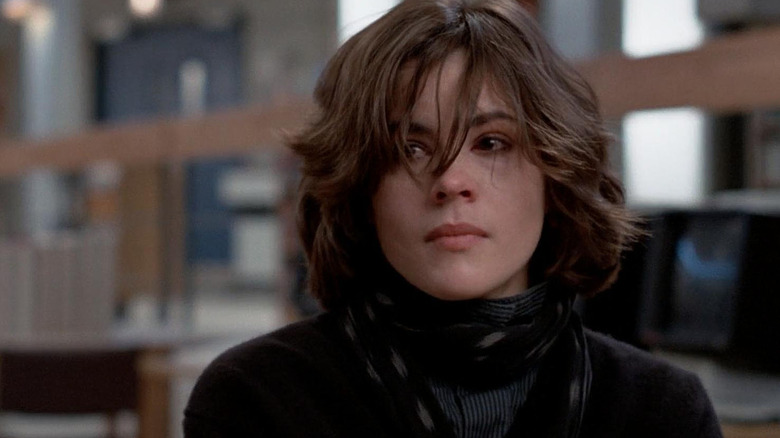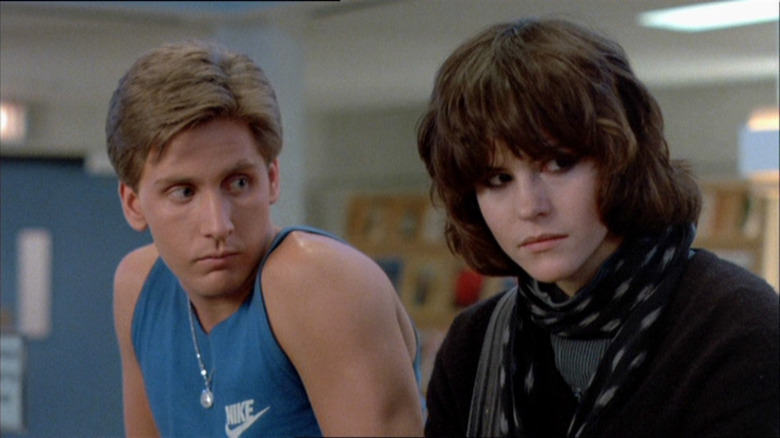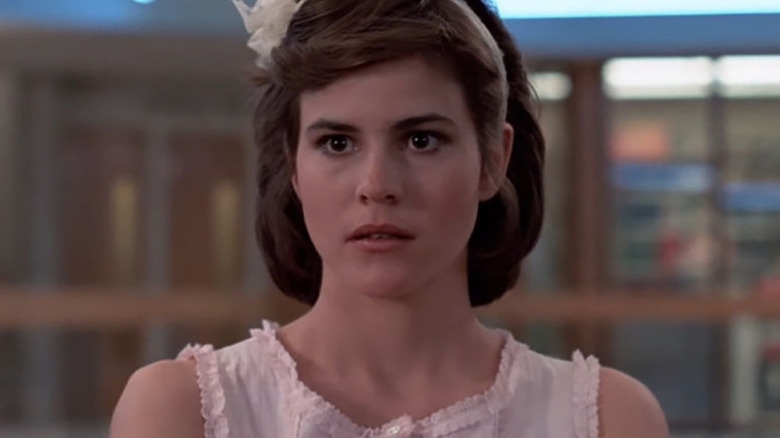Why Ally Sheedy Is Surprised The Breakfast Club Is Still Such A Beloved Movie
Until very recently, filmmaker John Hughes was viewed as an untouchable icon. The director, writer, and producer was involved in some of the best live-action comedies of the 1980s, including "National Lampoon's Vacation," "Weird Science," "Ferris Bueller's Day Off, "Planes, Trains, and Automobiles," "Uncle Buck," and "She's Having a Baby." Despite his impressive resume, Hughes is arguably best known for his trilogy of coming-of-age films featuring Molly Ringwald: "Sixteen Candles," "Pretty in Pink," and seminal classic, "The Breakfast Club." Hughes completely changed the landscape of teen cinema in the 1980s, showing that there was more to the genre than raunchy sex comedies, and there was a benefit in treating teenagers like human beings.
Unfortunately, as with a lot of films from thepast, his filmography hasn't aged kindly. "Sixteen Candles" is a cesspool of anti-Japanese racism and normalizes rape culture, Duckie in "Pretty in Pink" encourages the "nice guy" myth of the friend zone, and despite its beloved reputation, star Molly Ringwald struggled with whether or not to ever show "The Breakfast Club" to her daughter in a post-#MeToo era. Hughes' teen movies were pivotal and influential at the time, but the world has changed, and so too have our understandings of what sort of messages these films preach. What's incredible, is that "The Breakfast Club" could have been so much more sexist, but Ringwald had lobbied with Hughes to cut some of the more egregious moments from the original script. Considering she was essentially his muse at the time, he thankfully listened. But Ringwald isn't the only star to have her misgivings about the work of her teen years. Ally Sheedy who played gothy art-freak Allison Reynolds in "The Breakfast Club" also sees the film in a different light these days.
'I think there are some cringe moments in it'
"The Breakfast Club" centers on five students from different cliques who are all forced to spend a Saturday together in detention. Of course, they all enter the space with pre-conceived notions of one another, only to leave with a better understanding of who they are and empathy toward those they've never taken the chance to get to know until that fateful day. During a guest appearance on the popular "Behind the Velvet Rope" podcast, Sheedy shared her feelings with host David Yontef about the legacy of the film. She clearly understands that the film is beloved by many, but that the themes of sexism and misogyny cannot be ignored. "I think there are some cringe moments in it," she admitted.
While Sheedy didn't personally divulge every example of cringe, "The Breakfast Club" has plenty to choose from. Ringwald's Claire is constantly harassed, with John Bender even going as far as to say, "Hey, homeboy, why don't you go close that door, we'll get the prom queen impregnated." Principal Vernon fully threatens to punch John Bender in the face, and homophobic slurs are tossed around with ease.
It's unfair to judge a film from the past through the lens of the current social norms, and as uncomfortable as the language is to hear by current standards, we do have to remember that casually dropping the f-slur was a commonality at the time. "The Breakfast Club" does not condone the actions made by Principal Vernon, but Bender spends a movie sexually harassing a teenage girl and wins her heart at the end. His gnarly behavior is immediately forgiven, and he is rewarded with romantic affection. Accountability is nowhere to be found.
Allison enforces a misconception
Sheedy also confessed that she hadn't seen the film in a long time, but the actress knows that there are aspects of it that are dated and problematic. Her character Allison is portrayed as the "basketcase" of the group, with her edgy exterior presented as a form of social armor to keep people away from getting to know the real her. This perpetuates the untrue assumption that all alternative dressing kids are either starved for attention or just misunderstood/angsty teenagers who secretly want to be preppy and conform to the masses. That simply is not true. There are a multitude of reasons why a teenager may elect to wear a less conventional style, and Allison's makeover betrays that reality.
Claire restyles Allison, shedding her goth look for a pastel-prep shade of pink and a floral headband, which immediately grants her the affections of Andrew (Emilio Estevez). Allison was a weirdo who used her dandruff to make snow on her art project, but suddenly a superficial makeover has proven her "worthy" of the all-mighty jock.
"It is one of the things that surprises me about people still loving it, even now," Sheedy said. "That is actually an aspect of the movie that's problematic." She continued, "It's a mixed bag." Allison's makeover falls into a harmful trope, a la "Grease," that in order to be an acceptable girlfriend, a woman need to abandon her self-expression and identity in favor of being whatever a guy wants her to be.
While "The Breakfast Club" is by no means the most poorly aged teen film of the 1980s (that crown belongs to "Revenge of the Nerds"), it's important that we continue to interrogate such important works, because a history of acclaim is no excuse for perpetuating dated mindsets.


